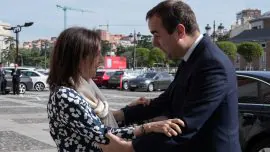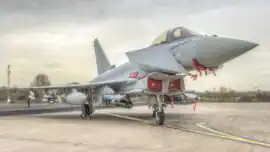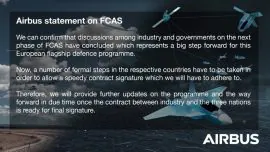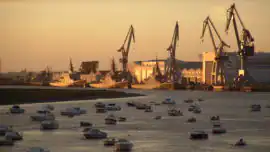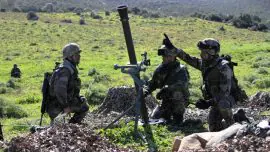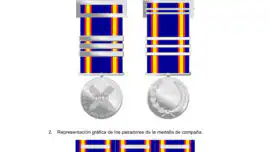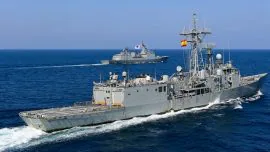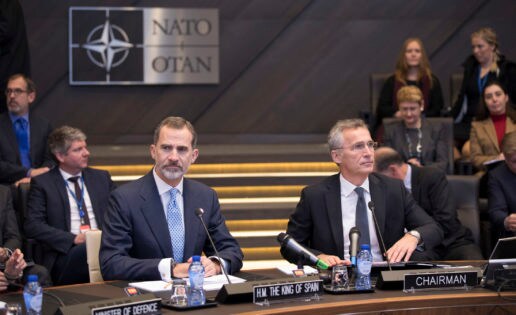
Su Majestad el Rey ha reivindicado este miércoles, en la nueva sede de la Alianza Atlántica, la Constitución Española de 1978 que recoge “los mismos valores y principios” de defensa de la democracia y la libertad que inspiran a la OTAN y sin la cual, ha recordado, España no habría entrado ni en la OTAN ni en la UE, informa Europa Press.
“Esta Constitución, no solo estableció un marco democrático, plural, de libertad avanzado y el Estado de Derecho para todos los individuos de España, sino que también permitió a España, una vez más, formar parte plenamente de la comunidad internacional”, ha defendido el Rey en un discurso institucional ante el Consejo del Atlántico Norte en el marco de su visita a la nueva sede de la Alianza.
Don Felipe ha recordado que “sin la Constitución de 1978, España no se habría convertido en un miembro de esta organización en 1982 ni un miembro de la Unión Europea en 1986” tras reivindicar que “los mismos valores y principios” de defensa de la democracia y la libertad que fundamentan a la OTAN, a punto de cumplir su 70 aniversario, también “están recogidos hoy en la Constitución española actual”, que cumplirá el 40 aniversario su cuatrigésimo aniversario este año.
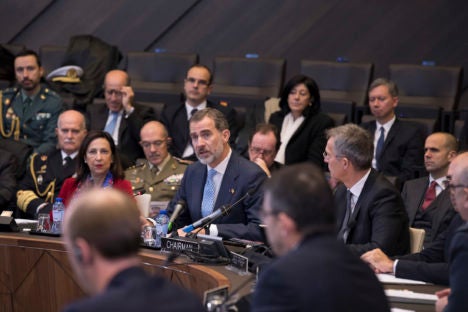
Felipe VI, que ha recordado su visita a la antigua sede de la Alianza en 2002 “siento entonces Príncipe heredero”, ha subrayado el “compromiso fuerte” de España tanto con la OTAN como con la Unión Europea y la necesidad de mantener “una relación trasatlántica fuerte”, recordando que esta nació mucho antes de la fundación de la Alianza en 1949, “hace 457 años”, cuando “en 1492” España “descubrió el nuevo mundo al viejo”, momento en el que se fijó “la idea fraternal de unidad” entre ambos lados del Atlántico.
A continuación el discurso de Su Majestad el Rey, tal y como ha sido pronunciado en inglés:
“Mr Secretary General, Ambassadors.
First of all allow me to thank you, Secretary General, for your kind words regarding myself and Spain. It is a real pleasure to be back since 2002; then as Crown Prince and now, to the new HQ, as King of Spain. And thank you also for the opportunity to address today’s session of the North Atlantic Council. It is a great honor.
So this is my first visit to the new headquarters —that was inaugurated just a few months ago. It surely represents, in the best possible way, not only the enduring importance of the Alliance, but also its ability –and our common will, and need− to adapt to new times and new challenges.
Mr Secretary General, Ambassadors.
Next year we will celebrate the 70th Anniversary of the Washington Treaty. Together, we will celebrate seventy years of commitment; seventy years of unity and defending our shared values.
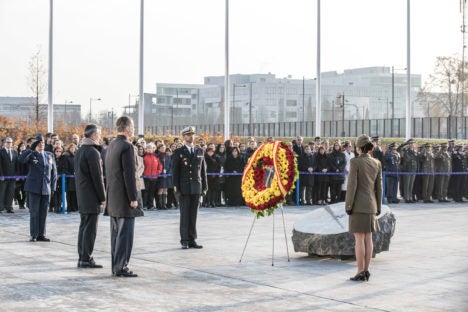
But these values and principles are not 70 yrs old!, or septuagenarian. No. They are much older than this great Alliance.
They are the same values and principles that inspired the Founding Fathers of the United States when they wrote the Declaration of Independence in 1776; they are the same values and principles that inspired the members of France’s National Constituent Assembly when they wrote the Declaration of the Rights of Man and of the Citizen in 1789; and they are the same values and principles that inspired the authors of Spain’s first constitution: the 1812 Constitution of Cadiz.
These same values and principles are −of course− today contained in Spain’s present constitution, of which we are celebrating its 40th Anniversary in just a few days. This constitution, not only established an advanced democratic, plural, framework of freedom and Rule of law for all of the people of Spain, but it also enabled Spain to once again be fully part of the international community. Indeed, without the Constitution of 1978, Spain would not have become a member of this Organization in 1982, or a member of the European Union in 1986.
Over the course of the seventy-year history that we will shortly commemorate, the Alliance has proven its capacity to effectively respond to any challenges and threats to global security, adapting to shifting historical and geostrategic circumstances, all aimed at guaranteeing the territorial integrity of the Allies and protecting the democratic values that are at the very foundation of our modern societies. This path of success is built on two higher values that define the Alliance’s present, and will define its future: the importance of unity, and the essential nature of the transatlantic relationship.
This second value—this essential nature—predates 1949, and is, in fact, much older. It was first forged 457 years before the Washington Treaty; because it was in 1492, when the Spanish Crown discovered the New World, when the idea of fraternal unity between the two shores of the Atlantic began to take shape; a unity that we continue to defend in these halls.
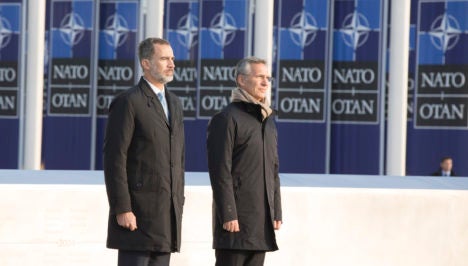
Mr Secretary General, Ambassadors.
It is clear that in today’s world NATO is facing a complex strategic environment, combining a myriad of threats —resurgence of old and familiar ones, and emergence of new dangers: hybrid threats that combine conventional and unconventional domains and which have enormous potential for destabilization, or cyberattacks and misinformation campaigns, which, in using new technology, are more difficult to contain and can affect our day-to-day lives.
These challenges are sometimes global, and are changing the security paradigms, as is the case of international terrorism, whose brutality we all sadly know —Spain particularly—and which we must fight together, if we are to be effective.
Cooperating with the EU and with other international organizations such as the UN, the OSCE, and the African Union is crucial to our security. Doing so with our partners —above all those that are strategically close— with the aim of projecting stability, is the best way to guarantee our own security. Therefore, the Alliance must continue to play an important role in the South, a region that is of particular interest to us, and in which some of the security challenges that most concern us are perhaps concentrated. It must do so through political dialogue and practical cooperation with our Mediterranean partners, as well as through the missions deployed in Afghanistan and Iraq, in which Spain is an active participant.

Mr Secretary General, Ambassadors.
Since joining NATO in 1982, Spain has demonstrated its sincere, active commitment to the Alliance; an Alliance that plays a key role in maintaining international peace and security, in accordance with the purposes and principles set down in Chapter I of the Charter of the United Nations.
My country has a unique geostrategic position —between Africa, Europe and America, between the Mediterranean and the Atlantic, between North and South— which makes Spain both a border and a bridge between countries and cultures, with a singular profile in terms of global security.
Respect for international law, and for a fair, inclusive and effective global governance —supported by our dedication to multilateralism— are the pillars of Spain’s commitment to the international order and to maintaining international peace and security. Spain firmly believes in preventive diplomacy, in peaceful solutions to international disputes, and in dialogue as a means of easing and even resolving conflicts.
It is with this conviction in mind that Spain actively contributes to the Alliance’s political and military endeavors. At present, there are approximately 3,000 men and women from Spain’s Armed Forces deployed abroad on NATO missions —and on EU, UN, and national missions— all clearly reflecting Spain’s determination to be an unwavering, steadfast ally.
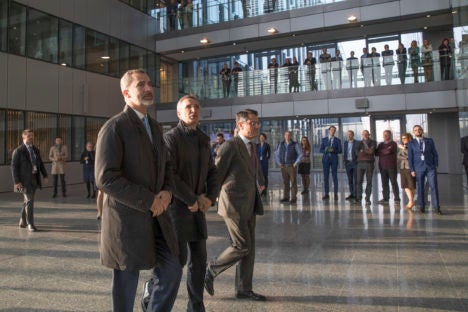
Men and women from our Army, our Navy and our Air Force, as well as our Civil Guard, have served or are serving in NATO actions, missions, and operations: They have served on land in Bosnia, Kosovo, Afghanistan, Iraq, Turkey, and Latvia; they have served in the skies over the Baltic and over Libya; they have served on the waters of the Mediterranean and the Indian Ocean. Wherever NATO is or has been, Spanish troops have also been present. That is our commitment; that is our hallmark.
As a strongly committed member of both NATO and the EU, Spain supports an ambitious European defense; a defense that increases our effectiveness in addressing the crises that affect our own security and that contributes to a better distribution of responsibilities between the two sides of the Atlantic. Europe can and must assume greater responsibility for our common defense and security. All of this in harmony with NATO. As part of this commitment to strengthening Europe’s security, Spain has the firm conviction that strong transatlantic ties must be maintained. Transatlantic solidarity and cohesion are fundamental.
Spain has defended collaboration between the two organizations, focusing on the complementarity and clear synergies that exist between them both, and on avoiding unnecessary overlaps and duplications. We welcome the unprecedented levels of cooperation achieved between the Atlantic Alliance and the European Union in recent years. The Declarations signed in Warsaw and Brussels are an indisputable proof of this. Please allow me, Mr Secretary General, to thank you for your personal involvement and dedication to achieving these advances, which my country truly appreciates.
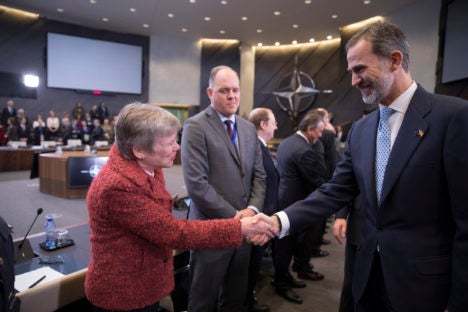
Cooperating with the EU and with other international organizations such as the UN, the OSCE, and the African Union is crucial to our security. Doing so with our partners —above all those that are strategically close— with the aim of projecting stability, is the best way to guarantee our own security. Therefore, the Alliance must continue to play an important role in the South, a region that is of particular interest to us, and in which some of the security challenges that most concern us are perhaps concentrated. It must do so through political dialogue and practical cooperation with our Mediterranean partners, as well as through the missions deployed in Afghanistan and Iraq, in which Spain is an active participant.
Security and peace in Europe are directly linked to greater stability in the Mediterranean region, where cooperation between NATO and the European Union is increasingly necessary, offering more and more possibilities for synergies.
I would also like to speak about Spain’s commitment to Women, Peace and Security, a matter that I understand will be discussed by the Council after this meeting has ended. Spain has been spearheading initiatives at the international level, and promoting women’s increased participation in conflict prevention and peacebuilding, combatting violations and abuses of their freedoms and dignity, with the conviction that gender inequality is yet another threat to international peace and security. We must all take on greater responsibility for effectively applying the regulatory framework we have helped to shape. The role of NATO is also fundamental in this area.
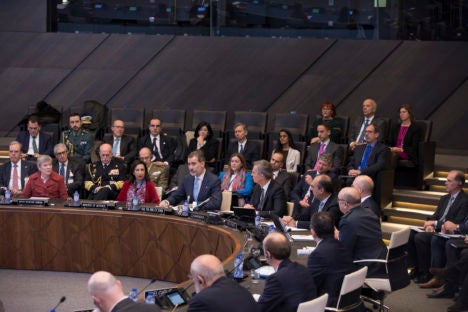
Mr Secretary General, Ambassadors.
I would also like, on this occasion, to honour those who have given their lives during NATO operations and missions, to uphold our shared values. We must never forget their exemplary dedication and sacrifice, which must guide us always in our daily work.
To conclude, I wish to emphasize the concept of commitment —a word that defines this Alliance like no other−; to emphasize NATO’s commitment to the values and principles that define us, as free societies; and also to emphasize Spain’s steadfast commitment to this Alliance, an alliance that will soon have stood for 70 years. May the next seven decades be equally full of successes in defending freedom and democracy. I, for one, am sure that they will.
Thank you very much”.
Seguir a @Villarejo en Twitter
Por Tierra, Mar y Aire en Facebook
Si tiene alguna noticia de Defensa: evillarejo@abc.es
ÚLTIMAS HISTORIAS DE «POR TIERRA MAR Y AIRE»
Los seis nuevos proyectos de la PESCO donde participa España
Bien por la rápida rectificación de la ministra Robles
Defensa no quiere a las Fuerzas Armadas en el Salón de la Enseñanza de Barcelona
El Consejo de Ministros aprueba este viernes la compra de 23 nuevos helicópteros NH-90
¿Dónde se encuentran ahora los submarinos españoles?
Robles confirma que las fragatas F-110 contarán con misiles «made in USA»
Cuando el desafío militar es compatibilizar los sistemas de comunicación y datos
Entramos en un “Exfab”, la fábrica con impresoras 3D de los marines de EE.UU.
Los buques de guerra rusos vuelven a repostar en Ceuta
Una fragata noruega construida por Navantia, a punto de hundirse por un accidente con el petrolero
Noruega (VI): artilleros antiaéreos de San Roque, a -17ºC
Noruega (V): Los carros Leopardo del Ejército contra “marines” en Oppdal
Pedro Baños: “A lo mejor Trump era el presidente que necesita EE.UU. en este momento”
Vídeo: el mensaje del Jemad en el Día de los Caídos por la Patria
Noruega (IV): vídeo del desembarco aerotransportado de españoles cerca del Ártico
Noruega (III): un «show» de la OTAN con mensaje
Noruega (II): los artilugios con los que experimenta la OTAN en Trident Juncture
Noruega (I): España, en la guerra del Ártico con la OTAN
Bélgica elige el caza F-35 frente a los europeos Eurofighter o Rafale
Nace la primera Feria Internacional de Defensa de España (apoyada por el Ministerio)
El corte de chapa de la primera corbeta saudí será el 9 de enero
Un portaaviones de EE.UU. entra en el Círculo Polar Ártico después de 27 años
Defensa modifica las tallas mínimas para poder ser militar
El extraño incidente que dejó chamuscado un F-16 belga
El Gobierno aprueba 85 millones para inhibidores de vehículos militares
Un 12 de Octubre sin campaña institucional ni “orgullo de ser español”
Defensa adjudica a la israelí aeronautics un contrato de avión no tripulado
El desfile militar por el 12 de Octubre repite lugar: junto al Bernabeu, 11 horas
Primer accidente de un avión de combate F-35, el caza más moderno de EE.UU.
La fragata Méndez Núñez y el destructor Carney se adiestran en defensa aérea
Diplomacia de defensa en la fiesta de la Embajada de Arabia Saudí
El Supremo admite el recurso del vicealmirante que el Gobierno envió forzosamente a la reserva

